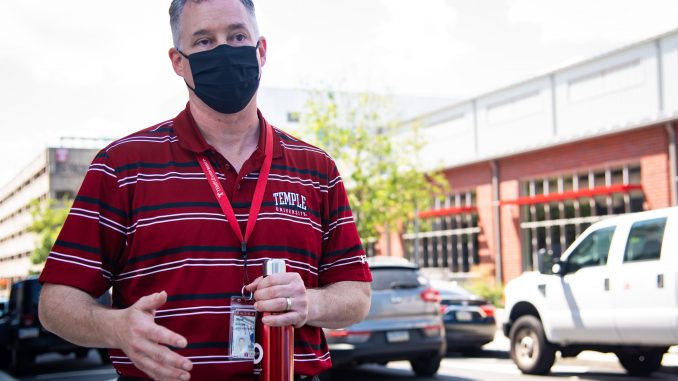
With the unveiling of its plan to teach a hybrid of in-person and online courses in Spring 2021, Temple University has also announced a comprehensive testing plan aimed at testing more than 20 times as many students, faculty and staff for COVID-19 than the university did in the fall semester.
Student Health Services is preparing to test 26,000 students and employees for COVID-19 per week during the spring semester, said Mark Denys, director of Student Health Services, compared to the average of 1,235 COVID-19 tests per week the university has administered for the last month, according to the university’s COVID-19 dashboard.
As part of its new policy, Temple will administer two mandatory tests per week to students living in university housing or taking in-person classes. University employees who interact with students on campus have the option of taking two tests per week as well.
Students who live off campus and do not take any in-person classes are eligible for one test per week, Denys said.
Temple’s hybrid approach to the fall semester ended after just one week of in-person classes as COVID-19 cases, largely attributed to small, off-campus gatherings of students, skyrocketed to 350 active cases at their peak in September, according to the dashboard.
As of Nov. 2, 48 students and employees have COVID-19. The week of Oct. 26 saw the lowest positivity rate among those tested since the week of Aug. 17 at 2.72 percent, The Temple News reported.
In the spring semester, the university will be able to test more students and staff because of increased testing supplies and laboratory capabilities, which the university did not have a month ago, Denys said.
“We’re hoping to give that better comfort level to students, faculty and staff, and everyone is being tested twice a week,” Denys said. “We’re hoping that it does change some behavior. Students know that they’re being tested twice a week, and they want to be negative twice a week.”
In addition to holding some in-person courses, Temple will open residence halls, Charles Library, the TECH Center and Campus Recreation for in-person use during the spring semester, The Temple News reported.
Student Health Services will open approximately four to eight new testing centers around campus for testing asymptomatic students and employees once or twice a week with molecular polymerase chain reaction nasal swab tests. Student Health Services will administer rapid tests at the Morgan Hall testing center for symptomatic students and employees, Denys said.
Temple began using rapid tests for testing symptomatic individuals on Monday. If the rapid test is negative but the patient has symptoms of COVID-19, Student Health Services will confirm that result with a PRC nasal swab test, Denys said.
Student Health Services also uses PRC nasal swab tests for close contacts and exposures, while saliva tests are used for asymptomatic individuals, Denys said. Student Health Services tests 50 students per day using saliva tests, and students must sign up one day in advance.
The contact tracing team will continue to interview every positive Temple student within 48 hours of being notified during the spring semester, wrote Kara Reid, head of Temple’s contact tracing team, in an email to The Temple News.
“The methods of contact tracing will not change and Temple University will continue to follow state and local guidelines,” Reid wrote. “We are evaluating the number of contact tracers needed and will increase the staffing as needed.”
Contact tracers will notify students and employees if they had close contact with a COVID-19 positive individual, Denys said. Each school department will also have a COVID-19 liaison who will send out proximity notifications if students or employees were in the general vicinity of a COVID-19 positive individual.
The model for testing students twice per week comes from the Broad Institute, which provides COVID-19 screening for more than 100 colleges and universities in the New England area, including Boston College and the University of Vermont, Denys said.
Testing students and employees two times per week is a step in the right direction, said Rob Pilarski, a freshman communication studies major.
“The two tests are a big step from what they were doing when we started in fall because we were tested like once [when] we got here and then that was about it,” Pilarski said.
Testing students twice per week sounds absurd, said Rachel Sanchez, a sophomore health professions major.
“It’s just a lot added on to the . . . school stress,” she said. “I don’t think I’ll be taking an in-person class if I come back next semester.”
Students who test negative still have to follow the four pillars of public health, Denys said.
“Testing doesn’t prevent COVID-19,” Denys said. “So just because someone tests negative today that doesn’t mean they’re going to test negative tomorrow.”


Be the first to comment